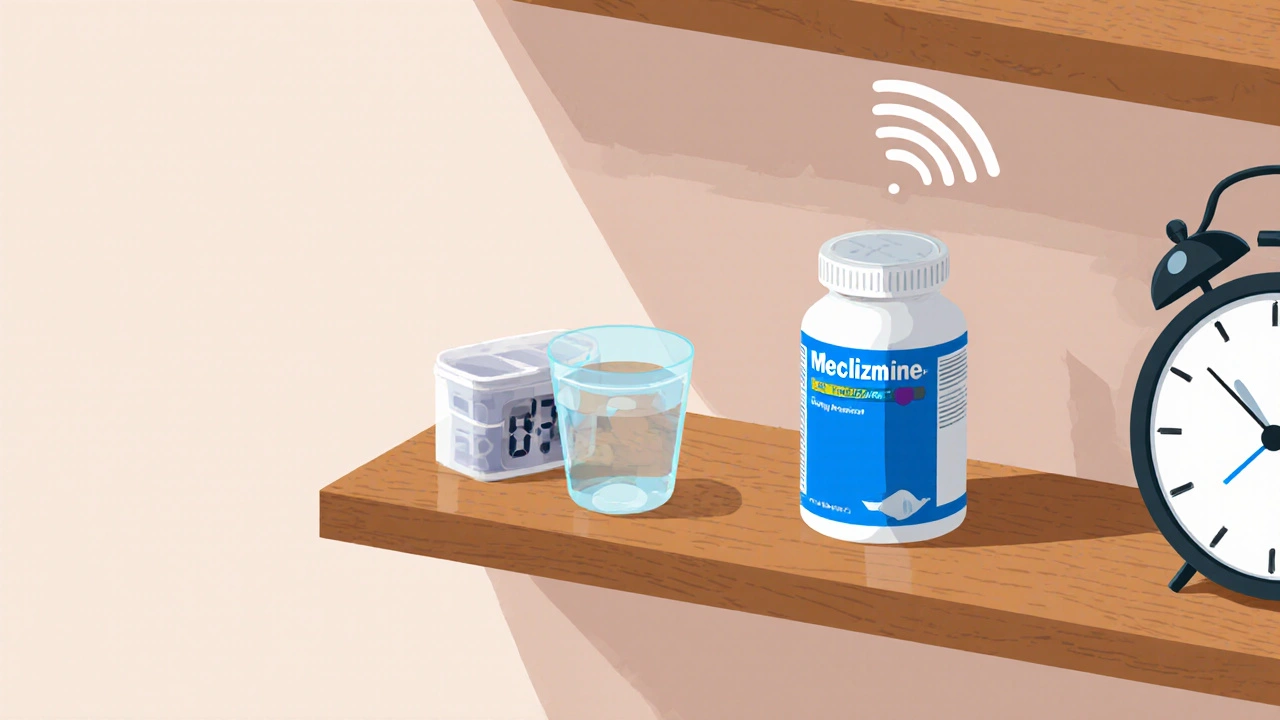Motion Sickness Medication Selector
Find Your Best Option
Answer these questions to get a personalized recommendation for motion sickness or vertigo relief.
1. What's your main concern?
2. How long will you need relief?
3. Are you sensitive to sedation?
4. Do you prefer natural remedies?
Key Factors to Consider
- Duration How long relief lasts
- Onset Time to feel effects
- Sedation Risk of drowsiness
- Availability OTC vs prescription
When dealing with motion‑induced nausea, Meclizine is an over‑the‑counter antihistamine commonly used to prevent and treat motion sickness and vertigo. It’s a staple in many home medicine cabinets, but a handful of other drugs and even some natural remedies can do the job just as well-or better-depending on the situation.
What is Meclizine and How Does It Work?
Meclizine belongs to the p‑diphenhydramine class of antihistamines. By blocking H1 histamine receptors in the brain’s vestibular nuclei, it dampens the signals that tell your inner ear you’re moving when you’re actually stationary. The result is less dizziness, less nausea, and a calmer stomach.
Typical adult dosing for motion‑sickness prevention is 25 mg taken 1 hour before travel, with a repeat dose if symptoms return after 24 hours. For vertigo, doctors often prescribe 25 mg three times a day, tapering off after a week. Most people feel the effect within 30 minutes, and the medication can last up to 24 hours.
Common Side Effects and Contra‑indications
Because it crosses the blood‑brain barrier, Meclizine can cause classic antihistamine side effects: drowsiness, dry mouth, blurred vision, and, in rare cases, urinary retention. Elderly patients should be cautious-sedation can increase fall risk.
Contra‑indications include known hypersensitivity to meclizine or other piperazine antihistamines, severe liver impairment, and use of monoamine‑oxidase inhibitors (MAOIs). Pregnant or breastfeeding women should consult a doctor before using it.
Top Alternatives to Meclizine
Below are the most frequently considered substitutes, each with its own mechanism and safety profile.
- Dimenhydrinate - a diphenhydramine‑based OTC drug marketed as Dramamine. It works by the same H1‑blocking pathway but tends to cause more pronounced drowsiness.
- Cyclizine - a piperazine antihistamine similar to meclizine, but with a faster onset (15‑30 minutes) and a shorter half‑life (about 8 hours).
- Promethazine - a phenothiazine antihistamine that also has anti‑emetic properties. It’s prescription‑only in many countries and can cause significant sedation and anticholinergic effects.
- Scopolamine - an anticholinergic patch placed behind the ear. It’s highly effective for motion‑induced nausea, especially seasickness, but can cause dry mouth, blurred vision, and confusion.
- Ginger - a natural root often taken as capsules, tea, or chews. Research shows ginger can reduce nausea from motion and chemotherapy without the sedation typical of antihistamines.
Side‑by‑Side Comparison
| Drug | Mechanism | OTC / Prescription | Onset | Duration | Typical Side Effects | Best For |
|---|---|---|---|---|---|---|
| Meclizine | H1‑receptor antagonist (piperazine) | OTC (25 mg) | 30 min | Up to 24 h | Drowsiness, dry mouth | Vertigo, travel‑induced nausea |
| Dimenhydrinate | H1‑receptor antagonist (diphenhydramine) | OTC | 30‑45 min | 4‑6 h | Strong drowsiness, anticholinergic | Sea‑sickness, short trips |
| Cyclizine | H1‑receptor antagonist (piperazine) | OTC | 15‑30 min | 12‑24 h | Mild drowsiness, dry mouth | Air travel, motion in cars |
| Promethazine | H1‑receptor antagonist + anti‑emetic | Prescription | 30‑60 min | 4‑6 h | Heavy sedation, hypotension | Severe nausea, post‑operative |
| Scopolamine | Muscarinic‑receptor blocker (anticholinergic) | Prescription (patch) | 1‑2 h | Up to 72 h (patch) | Dry mouth, blurred vision | Long‑duration sea travel, motion‑induced vomiting |
| Ginger | Anti‑inflammatory & 5‑HT3 antagonism (natural) | OTC (supplement) | 30‑60 min | 4‑6 h | Heartburn, mild stomach upset | Mild to moderate nausea, sensitive to sedation |
Choosing the Right Option for Your Situation
Here’s a quick decision guide:
- Need a long‑lasting solution for a week‑long cruise? Scopolamine patch gives up to 72 hours of coverage with a single application.
- Feeling drowsy is a deal‑breaker? Cyclizine tends to be less sedating than Dimenhydrinate, and ginger is essentially non‑sedating.
- Dealing with vertigo rather than motion sickness? Meclizine’s 24‑hour duration makes it a first‑line choice, especially for inner‑ear disorders.
- Prefer a prescription‑only drug for severe nausea? Promethazine provides strong anti‑emetic power but requires close medical supervision.
- Want a natural route with minimal side effects? Fresh ginger tea or standardized ginger capsules can curb mild nausea without the ‘sleepy’ feeling.

Pros & Cons Checklist
- Meclizine - Pros: long duration, effective for vertigo; Cons: moderate drowsiness, liver metabolism limits use in severe liver disease.
- Dimenhydrinate - Pros: widely available, cheap; Cons: high sedation, short duration.
- Cyclizine - Pros: fast onset, milder sedation; Cons: may need multiple doses for long trips.
- Promethazine - Pros: strong anti‑emetic; Cons: prescription only, can cause significant hypotension.
- Scopolamine - Pros: sustained release via patch; Cons: anticholinergic side effects, not ideal for glaucoma patients.
- Ginger - Pros: natural, no drowsiness; Cons: limited efficacy for severe motion sickness, variable supplement quality.
Practical Tips for Safe Use
- Take the medication with food or a full glass of water to lessen stomach upset.
- Avoid alcohol while on antihistamines; the combined sedation can be dangerous.
- If you’re driving or operating machinery, choose the least sedating option (cyclizine or ginger) and test it on a short trip first.
- Check for drug interactions: Meclizine and other antihistamines can amplify drowsiness when combined with opioids, benzodiazepines, or certain antidepressants.
- Store tablets in a cool, dry place and keep them out of children’s reach.
Frequently Asked Questions
Can I take Meclizine and Dimenhydrinate together?
No. Both drugs block the same H1 receptors and stacking them only increases the risk of drowsiness, dry mouth, and blurred vision without adding extra anti‑nausea benefit.
Is Scopolamine safe for older adults?
Use caution. Anticholinergic effects such as confusion and urinary retention are more common in people over 65. Always discuss with a healthcare professional before using the patch.
How much ginger should I take for motion sickness?
Research suggests 250 mg to 1 g of standardized ginger extract taken 30 minutes before travel. Fresh ginger tea works too - aim for about 2 g of grated root per cup.
Can Meclizine be used for chemotherapy‑induced nausea?
It’s not a first‑line choice. While some oncologists may add it for mild nausea, drugs like ondansetron or granisetron have stronger evidence for chemotherapy‑related nausea.
What should I do if I feel excessively drowsy after taking an antihistamine?
Stop driving, stay seated, and drink water. If the drowsiness persists for more than a few hours or you notice difficulty breathing, seek medical help.
